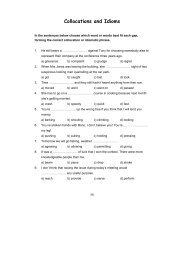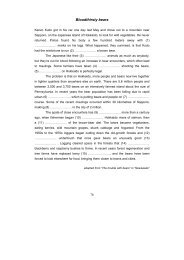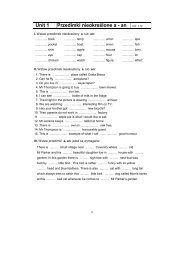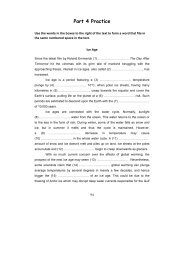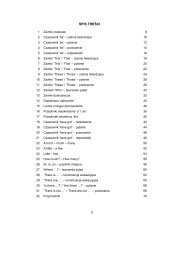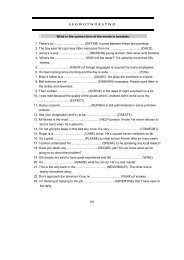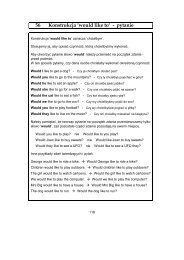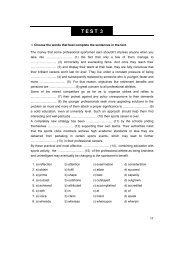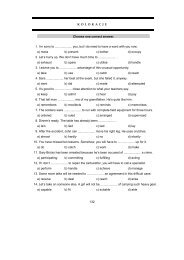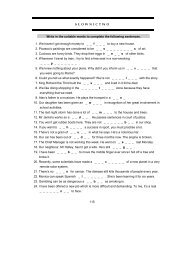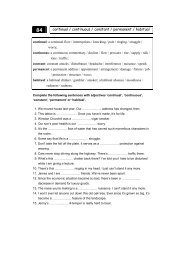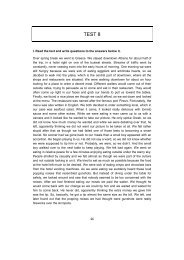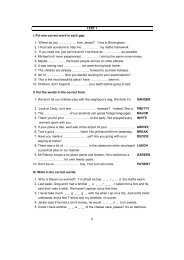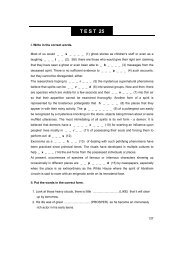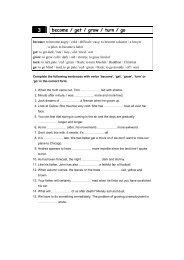Can - could - be able to - HandyBooks
Can - could - be able to - HandyBooks
Can - could - be able to - HandyBooks
- No tags were found...
Create successful ePaper yourself
Turn your PDF publications into a flip-book with our unique Google optimized e-Paper software.
May - might ⇒ 70<br />
Czasowniki modalne ‘may’ i ‘might’ słuŜą do wyraŜenia przypuszczenia lub moŜliwości<br />
w czasie teraźniejszym lub przyszłym. Forma ‘might’ wzmacnia niepewność danego<br />
przypuszczenia np.<br />
I don’t know this man at all. He might <strong>be</strong> a new worker here.<br />
John may <strong>be</strong> in the canteen now, but I’m not sure.<br />
‘When is Louis coming back’ ‘I don’t know exactly. He might come back next week.’<br />
Czasowniki ‘may’ oraz ‘might’ mogą takŜe wyraŜać przypuszczenie w postaci<br />
czynności trwającej np.<br />
‘What is Ben doing’ ‘He may / might <strong>be</strong> sitting in the garden.’<br />
Hurry up! Your friends may already <strong>be</strong> waiting for you.<br />
‘Might’ występuje w trybie przypuszczającym lub po czasowniku w czasie przeszłym<br />
(mowa zaleŜna) np.<br />
She might help you with maths if you asked her <strong>to</strong>.<br />
What might happen if I <strong>to</strong>uched the fuse<br />
Debbie said she might <strong>be</strong> busy in the evening.<br />
We knew there might <strong>be</strong> problems with communication.<br />
May - <strong>be</strong> allowed <strong>to</strong> ⇒ 71<br />
Czasownik ‘may’ wyraŜający pozwolenie lub zakaz wykonania danej czynności odnosi<br />
się do czasu teraźniejszego lub przyszłego. Forma ‘might’ s<strong>to</strong>sowana jest tylko w<br />
trybie przypuszczającym lub po czasowniku w czasie przeszłym (mowa zaleŜna).<br />
Be allowed <strong>to</strong> - jest wyraŜeniem alternatywnym dla czasownika ‘may’ w czasie<br />
teraźniejszym np.<br />
I may smoke cigarettes. = I am allowed <strong>to</strong> smoke cigarettes.<br />
May they play here = Are they allowed <strong>to</strong> play here<br />
‘Be allowed <strong>to</strong>’ występuje w czasach ‘Perfect’, ‘Past’ oraz ‘Future’, w których<br />
czasownika ‘may’ nie s<strong>to</strong>suje się. Zwrot ten uŜywany jest szczególnie w odniesieniu<br />
do czynności pojedynczej np.<br />
I showed the mem<strong>be</strong>rship card and I was allowed <strong>to</strong> enter the club.<br />
We weren’t allowed <strong>to</strong> spend the night outside the boarding house.<br />
W znaczeniu pozwolenia lub zakazu w czasie przeszłym zamiast ‘<strong>be</strong> allowed <strong>to</strong>’<br />
moŜna zas<strong>to</strong>sować czasownik ‘<strong>could</strong>’ np.<br />
I was allowed <strong>to</strong> copy the files. = I <strong>could</strong> copy the files.<br />
They weren’t allowed <strong>to</strong> use the room. = They <strong>could</strong>n’t use the room.



